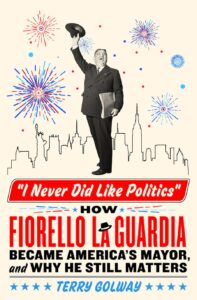
When young writers, particularly would-be journalists, ask me for advice about improving their thinking as well as their writing, I tell them to consider some topic about which they have strong personal feelings.
Then write an essay arguing vigorously in favor of the other side’s opinion. Make sure it is loaded with facts and figures to support the thesis. And construct your argument with just the one hand—no other hand, please.
This is not a particularly popular exercise these days for obvious reasons. But through my half-century as a journalist and as the author of more than a dozen books, I’ve found the mirror-image school of writing to be useful and creative.
I’d like to think that kind of open-mindedness has made me a better historian as well as a good journalist.It definitely came in handy when I was the chief editorial writer for the New York Observer back in its turn-of-the-century brilliance under publisher Arthur Carter and editor Peter Kaplan. The weekly editorials were Arthur’s platform—he paid the bills (which were always far larger than the paper’s revenue), so he had every right to make whatever arguments struck his fancy on a given week. My job was to turn his opinions into readable prose for the editorial page.
One night in 2000 or so, I made a rare appearance at some event loaded with journalists and people we’d now call influencers. Somebody took me aside and complimented me on that week’s main editorial. Although the editorials were unsigned, many Observer readers knew I wrote most of them. And this particular editorial, my new friend said, was one of the best things he’d ever read on the topic.
I smiled graciously and decided that my life as a journalistic method actor was now complete. Because I disagreed with every word in that editorial. I even disagreed with the punctuation.
I don’t remember what the topic was—probably one of those small issues that defined pre-9/11 American politics. And, to be sure, if Arthur’s views really offended me—if, for example, he wished to argue in favor of higher tariffs on Irish whiskey—I would have been given a pass and somebody else on staff would have written the piece. But I regarded the assignment as an intellectual as well as a journalistic challenge.
Does that make me an appalling hack or a consummate professional? I’d argue the latter, but in keeping with the spirit of this essay, I’ll not reject the former.
That willingness to see both sides also proved immensely valuable when I embarked on my most-recent book, “I Never Did Like Politics”: How Fiorello La Guardia Became America’s Mayor and Why He Still Matters. It examines how this man who claimed to loathe politics managed to transform New York’s political system and government, and did so while becoming one of the most-popular public figures of his day. And yes, he really did say, “I never did like politics.” In fact, he said it in 1942, as he began his third term as mayor of New York City and after having been in elected office for the better part of a quarter-century.
His greatest enemy was New York’s famous political machine, Tammany Hall, whose depredations he read about as a young boy growing up in Prescott, Arizona. In La Guardia’s eyes, all politicians were the same: Crooked until proven otherwise. He didn’t make an exception for himself because he didn’t consider himself a politician at all. As I mention in the book, he demanded to be called a…municipal officer.
In countless letters and in speeches, La Guardia took pains to make sure people never confused him with the hacks and timeservers who populated the public payroll. And he was a bipartisan offender: In his loud, high-pitched voice, he delighted in assailing his fellow Republicans as vehemently as he did Tammany Democrats.
So far, so good, yes? Except for this: A decade ago, I published a book called Machine Made: Tammany Hall and the Creation of Modern American Politics. In it, I argued that Tammany is unjustifiably condemned as an irredeemable force for evil when, in fact, it was often a god-send for the immigrant poor. I described how it supported historic social welfare and workplace reforms in the first quarter of the 20th century and, more to the point, got those reforms written into law. In other words, in the phrasing of one critic, I made the case that Tammany was often on the right side of history.
And now, for my next trick, I bring you Fiorello La Guardia, the single most-formidable enemy Tammany ever faced, the man historians believe did more than anyone to bring about Tammany’s eventual demise.
I fear that open-mindedness may be disappearing from literary and intellectual life. I hope I’m wrong.Small wonder that upon hearing of my La Guardia project, friends responded with the same eloquent phrase: “Huh?”
At first glance, sure, the notion of writing a positive book about Tammany Hall and following it up with an admiring study of Fiorello La Guardia might seem as contradictory as waxing eloquent about the fairness of the American electoral system while wearing a red MAGA hat. Huh?
But because of my very old-school training as a journalist, I don’t see the problem. Tammany and La Guardia may have been New York’s Athens and Sparta a hundred years ago, but my job was to find out what made them tick. I saw Tammany’s point about the aloofness of its critics. I saw La Guardia’s point about Tammany’s corrupt practices. I saw where Tammany got La Guardia wrong (he was many things, but aloof wasn’t one of them) and what La Guardia got wrong about Tammany (at its best, it defended immigrants and the poor when nobody else would).
Yes, I had to swerve a bit here and there, but I was able to present La Guardia’s point of view with almost as much energy and enthusiasm as he did himself. I found myself nodding in agreement when he attacked Tammany’s excesses, and I winced when I read his pig-headed refusal to acknowledge any good Tammany may have achieved.
I’d like to think that kind of open-mindedness has made me a better historian as well as a good journalist. It might even have made me a better person, though I suppose the jury is still out on that one. (Vote early and often, folks, as Tammany might have said.)
I fear that open-mindedness may be disappearing from literary and intellectual life. I hope I’m wrong.
But if need be, I can whip up an argument saying open-mindedness is overrated. Just give me a word count and a deadline.
__________________________________

“I Never Did Like Politics:” How Fiorello La Guardia Became America’s Mayor, and Why He Still Matters by Terry Golway is available from St. Martin’s Press, an imprint of Macmillan, Inc.









 Bengali (Bangladesh) ·
Bengali (Bangladesh) ·  English (United States) ·
English (United States) ·